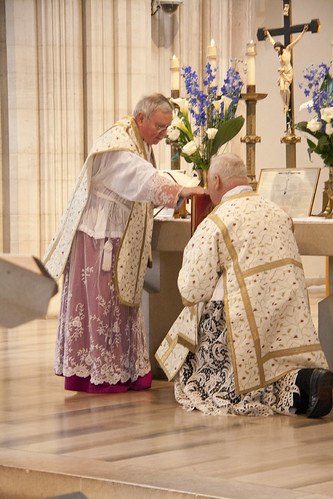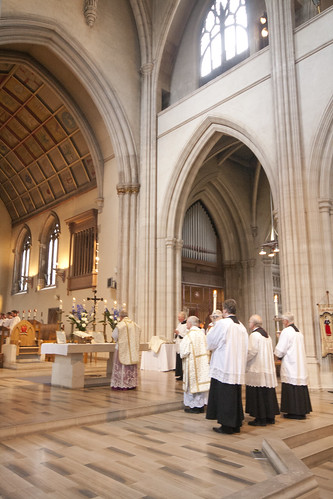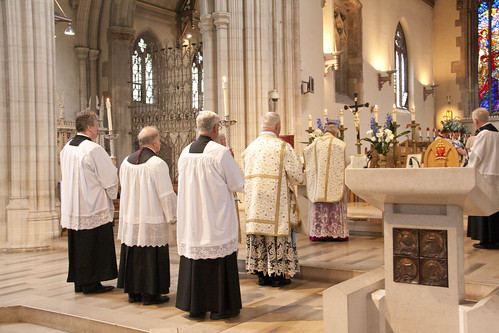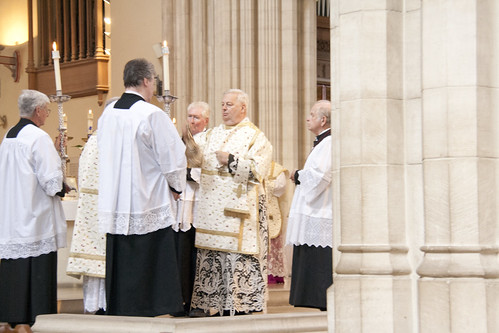 Having readings in Latin at Mass is something which many people find rather baffling about the Traditional Mass. Today I am posting a Position Paper on the subject over on Rorate Caeli, defending the traditional practice: go there to read it.
Having readings in Latin at Mass is something which many people find rather baffling about the Traditional Mass. Today I am posting a Position Paper on the subject over on Rorate Caeli, defending the traditional practice: go there to read it.Here I want to reflect on an associated issue: the wider question of the use of the vernacular at the Traditional Mass. One of the things which struck me when reading up on the topic is a polarisation of views, among those who want to mix Latin and the vernacular, as to which should be used for what. I think this is quite revealing.
One view says that they should be used for the changing parts of the Mass - the parts which are unfamiliar. If we had the readings and the proper prayers in English (or whatever vernacular we are considering), then we wouldn't have to refer to our Mass books. We are after all familiar enough with the unchanging parts - or, if we're not, we will be in time. This is essentially what happens in most Latin Novus Ordo Masses: we revert to Latin in the bits everyone knows, like the Agnus Dei, the little dialogues ('Dominus vobiscum!' and everyone booms back, at different speeds, 'Et cum spiritu tuo!'), the Canon, and the Pater Noster.
The other view is the opposite. The most obscure propers, like the Collect, should be kept in Latin, and English should be used for really familiar things like the Pater Noster. This is the view of the influential and highly regarded liturgical schola László Dobsay. He's quoted in a footnote to the Position Paper as follows:
The citations from, and references to, the liturgical texts are present in the works of the Church Fathers and many spiritual writers, as well as in the prayers and meditations of the saints. Priests and a lay people who have a high level of theological formation but do not know the Latin liturgy extremely well (which means now they are not familiar with the Latin texts), surely cut themselves off from the historical records of the Church’s life. Not to know the vocabulary used, or the sentences referred to, means not being able to recognize their context and origin in the theological and spiritual literature of the tradition itself.
This is an interesting and powerful argument. But it applies equally, or more, to the Scriptures. Sacred Scripture is the basis of theology, and the terms of Sacred Scripture have an even more fundamental importance than the terms of the Collects. The Vulgate version of the Scriptures, which is used in the readings, has been pondered and commented upon by the great theologians of every generation since it was composed; often enough the earlier versions, used by St Augustine and others, are close enough to this text too. It diverges in certain ways from modern English translations, and it is exactly for this reason that it is important for us to keep up some familiarity with it: otherwise we risk losing touch with what the Fathers and Doctors are talking about.
This subject, of course, takes us back to an earlier Position Paper: on the use of the Vulgate and Ancient Latin Psalters.
 Dobsay's suggestion that some of the most familiar texts of Mass should be in the vernacular, including the Pater Noster, remains baffling. What is supposed to be the point of this? Everyone - for practical purposes - knows the Our Father in their native language, so you aren't telling them anything they didn't already know when you recite it in English. It doesn't take long for people to become thoroughly familiar with the Pater Noster in Latin, and it is not uncommon for people to pray or sing it in Latin, as we do on traddy pilgrimages. Why break out of the sacred language for the sake of a text we know by heart?
Dobsay's suggestion that some of the most familiar texts of Mass should be in the vernacular, including the Pater Noster, remains baffling. What is supposed to be the point of this? Everyone - for practical purposes - knows the Our Father in their native language, so you aren't telling them anything they didn't already know when you recite it in English. It doesn't take long for people to become thoroughly familiar with the Pater Noster in Latin, and it is not uncommon for people to pray or sing it in Latin, as we do on traddy pilgrimages. Why break out of the sacred language for the sake of a text we know by heart?To some extent the argument of familiarity applies to the readings. Because we are familiar with the Gospel stories, especially those used at Mass which we read in our hand-missals, it doesn't take long before you often recognise what the story is as it is being read, from the odd name or phrase: St John the Baptist and Herod, the Rich Man and Lazarus, and so on. If you listen to it and follow it in a missal, you start to recognise more and more of it, and you start to notice quotations from it in some of the other propers of the day. Even if you have little or no Latin to start with, you gain a certain familiarity with both the words and the meaning.
I can't help thinking that the only reason for Dobsay to suggest having the Pater Noster in the vernacular is that he wanted to say something should be in the vernacular, and couldn't think of anything else. But, as the paper argues, a problem is raised by even the most limited use of vernacular, because we end up switching between two languages. This, if you think about it, is a very strange thing to do, and it makes it impossible for Latin to mark out a sacred, liturgical space.
Pictures: preparations for the proclamation of the Gospel, Solemn Mass in St George's Cathedral, Southwark, for the Latin Mass Society's Annual General Meeting. The gospel procession pauses in the middle of the sanctuary to allow the singers to complete the Gradual and Alleluia.


I would agree that Dobszay's comments about mixing the two languages are a bit mystifying/puzzling for me too. He puts considerable weight on the preparation of bilingual books, where both languages (i.e. the vernacular) is worthy for use in celebration. Although he seems to lean toward restoring the Latin Office, he seems inclined otherwise for the celebration of the sacraments and for the Holy Sacrifice in particular. In any case, I'll go read the paper!
ReplyDeleteMy only childhood experience of the vernacular in Low Mass pre-Vatican II was the reading of the Epistle and Gospel from the pulpit, both of which the priest had already said in Latin.
ReplyDeleteThis applied to Sunday, with prayers in the vernacular at the foot of the altar at the end. Weekday Low Mass was said entirely in Latin. I was intrigued enough to ask for a Latin/English missal, which opened up the meanings of the celebrant's gestures and silent prayers and I became hooked.
It's the apparent discouragement of curiosity post-Vatican II by those who should know better which stumps me. A Latin Mass with vernacular translations to hand in the missal ain't that difficult.
When I was working in Brussels a few months ago, I was surprised that the FSSP parish I attended had the readings in French. Latin would, I am sure, be less divisive in a country with such tension between French and Flemish speakers. As it was, I was having to work extra hard linking the French spoken word to the Latin text before referring to the English translation.
ReplyDeleteI'm a seven year member of an FSSP parish. I have to say that this matter has been on my mind for a long time.
ReplyDeleteAs the SSPX celebrated the '65 Ordo until 1982, I've long thought that a revival of the 1965 Mass as the "Mass of the Council," would be the solution to obtain the liturgical peace, and again give the Roman Rite a single "use." Both parties, pro Novus Ordo and pro '62, would have to sacrifice, but the '65, being both organic (per Alcuin Reid)and nipped and tucked per Sacrosanctam Concilium, would be satisfactory to both liberals and trads.
I've changed my mind. I think SC supremely unnecessary, dated, and based on transitory and false academic premises. I would much rather see SC annulled. Because Latin is so far from the experience of most in the pew, and because it's in fact feared by many, to ease the transition I would also see permission for the TLM to be celebrated in hierarchic vernacular. I'd also see Peter shake the keys with a clear declaration in the opening pages of such a Missal that any deliberate departure from the rubrics, unless in imminent danger of death, results in mortal sin on the part of the priest.
This comment has been removed by the author.
ReplyDeleteThis comment has been removed by the author.
DeleteSorry, I'll try again! I don't see that it's necessary to understand what the priest is saying. The Mass is a propitiatory Sacrifice, the offering of the Divine Victim at the hands of His priest to the Divine Father. It is not a Protestant, didactic, expository 'service'. I have a little Latin but the little old lady ridiculed by the 'reformers' who knelt at Mass saying her Rosary heard Mass far more devoutly that the liturgists hollering the responses and 'actively participating'.
Deletejon have you attended an Anglican Use mass. It is strikingly similar to the TLM only in King James English. English chanting is extraordinarily beautiful.
ReplyDeleteB Beard,
ReplyDeleteI have, and I've followed the developments regarding the new Ordinariate Mass closely. I'm happy that great chunks of it will reflect traditional usage, including the old Offertory. However, it's a gift given to a few. I'm hoping, like the freeing of the TLM, it will have an ameliorating effect on the Novus Ordo Church, but it won't be enough.
I would rather see all that reasoned, academic energy currently bent on making a silk purse from a sow's ear directed to the thorough abandonment of the Novus Ordo, and a decent solution suggested. I think permission for the TLM in a hierarchic precisely what's needed.
I want to also state that the anglican use mass does not match the tridentine mass, it IS a novus ordo mass ultimately, for that's what it's lectionary uses. Indeed the 1965 Mass or an Anglican use equivalent that is identical to all the traditional latin form is the only longterm solution to unite the Roman Catholic Church and bring about peace and end to intense factionalization.
ReplyDeleteTo contrast the RC anglican use mass currently used, one can compare it to the Antiochian Orthodox adaptation of the Anglican Missal, where all the tridentine readings, rubrics and ordinary line up word for word identically with the average old latin mass useed today. That's where modernized rome continues to error, to not copy the wisdom of the Orthodox Church in allowing more fully genuine tradition in a language besides latin.
ReplyDeleteI agree with Jon. In the Eastern Orthodox Church, which we can all agree has the best example for consistently traditional liturgy in the entire world. In the average Greek Orthodox Archdiocese of America parish it is normal to use 50% greek 50% english for their divine liturgy, does this make everyone perfectly happy? No, but it's darn close to good enough, overtime the price for unity is paid by this arrangement. It brings profound peace to an otherwise divise issue, which would favour younger generations and older/recent immigrant generations being at odds over the language used. Using both languages keeps everyone happy. They repeat the Our Father and Creed in both languages. Those who are more comfortable respond in whichever they prefer or know best, it takes nothing away from the liturgy in my opinion. Liturgy is not a performance or or ideal show, it is ment to bring peace, it is prayer to God, it needs to find a balance. When it comes to the faith itself and the preservation of all the practices and teachings (and modesty of women covering their heads and men not wearing t shirts) I happily accept the latin mass as it is. I've been to SSPX masses, FSSP Masses, Anglican use masses and Western rite Orthodox Masses. I have to agree that within my extended family, various people have a psychological fear of exclusive use of latin liturgy, this is an important fact and I can not talk them out of it. I think the only hope for the TRADITIONAL mass to become MAINSTREAM is for some degree of acceptance of vernacular language or simply other liturgical languages being used, meaning languages besides latin. It is true that that Archb. Marcel Lebfebrve used the 1965 mass until 1974 or later. If the single biggest obstacle to the spread of traditional teachings and faith and liturgy is insistence on a different language, I am prepared to sacrifice this for the greater good of all. So my friends, learn well for the price to be paid for compromise and greater good is in fact the abandonment of all latin all the time. It is not essential the the faith and the eastern churches have learned well how to work with a wide range of languages yet preserve a single faith (albeit not without a schism or two..)
ReplyDelete